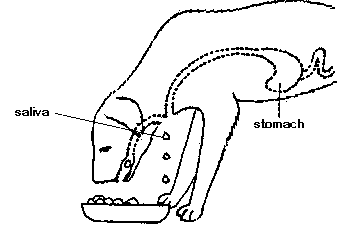In 1906 Pavlov cut holes in dogs' cheeks and inserted tubes to measure salivation. A bell was rung just before food was given to the dogs, and after a period of time it was observed that the ringing of the bell alone would increase the rate of the dogs' salivation. These reflexes constituted the basis of animal behavior. Pavlov dealt primarily with animals and was a natural step along the path of current psychology which views Man as nothing more than an animal to be similarly manipulated and controlled by environmental forces. This view postulates that the subject matter of human psychology is only the behavior of the human being. Behaviorism claims that consciousness is neither a definite nor a usable concept. The behaviorist holds, further, that belief in the existence of consciousness goes back to the ancient days of superstition and magic and is useless. The behaviorist asks: Why don't we make what we can observe the real field of psychology? Let us limit ourselves to things that can be observed, and formulate laws concerning only those things. Now what can we observe? We can observe behavior - what the organism does. The interest of the behaviorist in man's doings is more than the interest of the spectator - he wants to control man's reactions as physical scientists want to control and manipulate other natural phenomena. It is the business of behavioristic psychology to be able to predict and to control human activity. Watson says, "Why do people behave as they do - how can I, as a behaviorist, working in the interests of science, get individuals to behave differently today from the way they acted yesterday? How far can we modify behavior by training (conditioning)? These are some of the major problems of behavioristic psychology." As should be obvious to the reader that "behavioral psychology" has nothing to do with psychology per se, and all to do with managing behavior. It denies the very thing which separates Man from the rest of the animal kingdom - the human mind. It is a souless pusuit which sees Man as an animal who must adapt to the environment, that is, the social system and political regime, rather than adapting the environment to his own vision and will. In this regard the subject has enbraced by governments all oer the world, as hopefully it would supply them with an effective way to finally get the public to finally behave as they desire. It hasn't exactly worked out that way, but that hasn't stopped them from continuing to try.
Suggested Reading!About Behaviorism - by B. F. SkinnerBeyond Freedom and Dignity - by B. F. Skinner Behaviorism - by John Watson Waldon Two - by B. F. Skinner Say NO To Psychiatry! Back to Behaviorism Main Page Back to Main SNTP Page
|
||||||||||||||||||||||||



